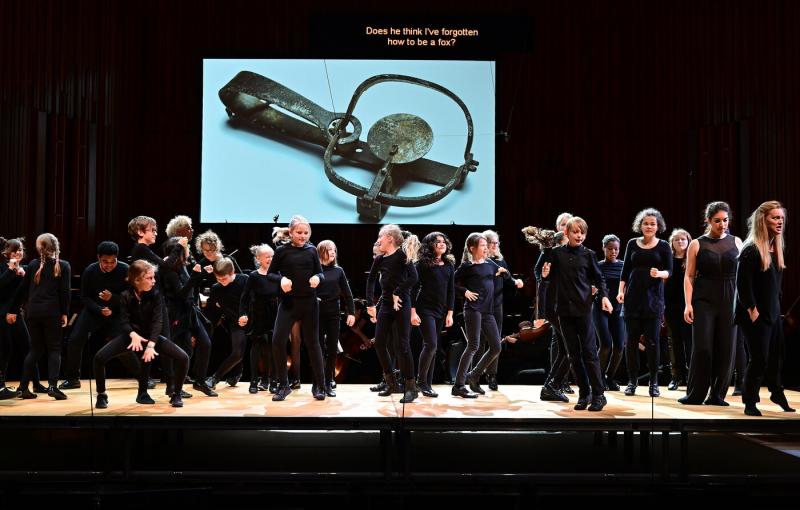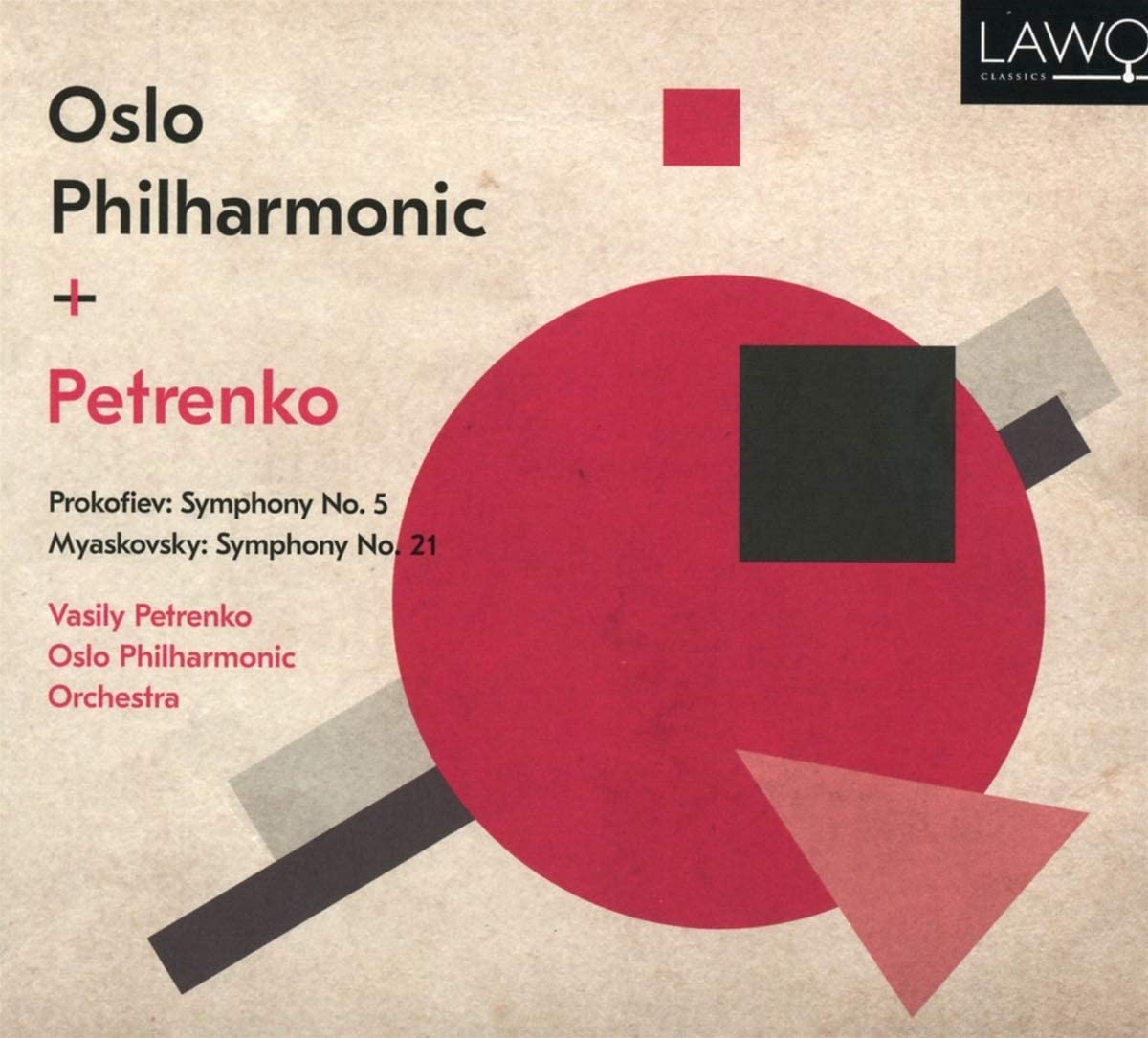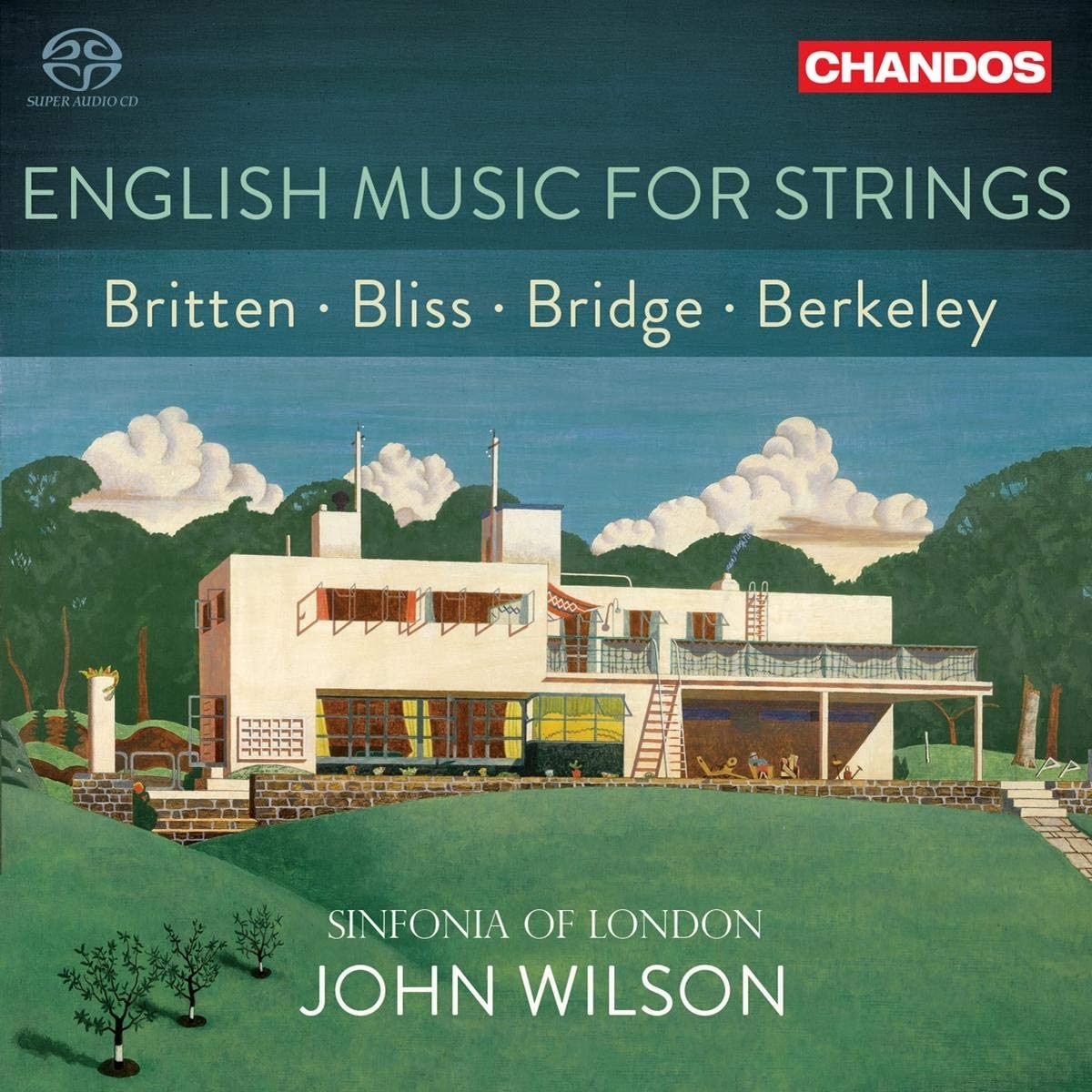Classical CDs: Janáček, Myaskovsky, Prokofiev, John Wilson | reviews, news & interviews
Classical CDs: Janáček, Myaskovsky, Prokofiev, John Wilson
Classical CDs: Janáček, Myaskovsky, Prokofiev, John Wilson
An arboreal opera, two Soviet symphonies and some rarely heard English string music

 Janáček: The Cunning Little Vixen, Sinfonietta Lucy Crowe, Gerald Finley, Sophia Burgos London Symphony Orchestra and Chorus/Sir Simon Rattle (LSO Live)
Janáček: The Cunning Little Vixen, Sinfonietta Lucy Crowe, Gerald Finley, Sophia Burgos London Symphony Orchestra and Chorus/Sir Simon Rattle (LSO Live)
You know this is going to be good within seconds of Act 1 awakening, Janáček’s arboreal prelude teeming with life. Making this tricksy score sound so natural and unforced takes rare skill, and it’s to Simon Rattle’s credit that his pliant London Symphony Orchestra play with such care and affection. Orchestrally this is easily a match for Charles Mackerras’s vibrant Vienna version, recorded under studio conditions in the early 1980s. Passages like the first act’s brief, ecstatic Interlude really take wing, the idyll abruptly shattered by the dog and the cockerel. They’re brilliantly characterised by Anna Lapkovskaja and Peter Hoare, another of this set’s joys being an excellent supporting cast. There’s not a weak link. Owls, jays, frogs, poultry – all vividly portrayed, with a special shout out to Jan Martiník’s grumpy badger cameo at the start of Act 2.
Superb leads, too. Lucy Crowe’s Vixen is both earthy and sultry, the perfect foil for Gerald Finley’s gruff Forester. Sophia Burgos is a charismatic Fox. The big ensemble numbers are marvellous, notably an incandescent wedding sequence, the LSO’s trumpets blasting out. Chorus work is very fine, especially from the young singers of the LSO Discovery Voices impersonating fox cubs. Rattle writes movingly in the booklet about this opera prompting him to want to be an opera conductor, and this is one of the best things he’s given us on disc, his love for the work never suffocating it. Joyous stuff, and beautifully recorded, the semi-staged June 2019 performances is directed by Peter Sellars. There’s a good coupling too, this Janáček Sinfonietta punchier and better played than Rattle’s earlier Philharmonia recording. You can feel the Barbican’s walls buckling when the fanfares are reprised in the closing minutes. Glorious. This is an unmissable bargain, and it comes with full texts and translations.
 Prokofiev: Symphony No. 5, Myaskovsky: Symphony No. 21 Oslo Philharmonic Orchestra/Vasily Petrenko (Lawo Classics)
Prokofiev: Symphony No. 5, Myaskovsky: Symphony No. 21 Oslo Philharmonic Orchestra/Vasily Petrenko (Lawo Classics)
Getting the opening tempo of Prokofiev 5 is deceptively difficult; open just a tad too slowly and the first movement can really drag. There’s a painfully heavy Bernstein recording from the 1980s which is best avoided, but Vasily Petrenko does get it right at just over 14 minutes. He’s helped by an orchestra with an indecently lush string sound: this symphony needs plenty of deep, rich bass, and the Oslo Philharmonic’s low brass also excel, Prokofiev’s important tuba lines very present. Petrenko turns the screws remorselessly, the sense of release when we hit the first movement’s mighty coda overwhelming. Prokofiev had a knack of writing peculiar cadences, prefacing the resolution onto brassy B flat with a screeching dissonance. The motoric scherzo, reusing music originally written for Romeo and Juliet, zips along, and Petrenko nails the main theme’s da capo, muted trumpets quacking like ducks. This is ostensibly a victory symphony, premiered in the final months of World War II, but shadows are never far away. This performance has bite, notably in a steadily paced Adagio which erupts halfway through. All good then, closing with a finale showing its teeth. What an ending this symphony has: unexpectedly taking us into a cocktail lounge before a unison B flat which feels like a kick in the face. Lawo’s sound is deep and close, which suits me fine.
Petrenko’s coupling is the Symphony No. 21 by Prokofiev’s friend and fellow-student Nikolai Myaskovsky, a brooding single movement composed in 1940. It feels much weightier than its 15-minute span, a lively central section followed by a slow, dark epilogue. Myaskovsky wrote 27 symphonies – if No. 21 intrigues, there’s a lot more to discover. Petrenko is persuasive, and hopefully there’ll be more to come from this source.
 English Music for Strings – Music by Britten, Bliss, Bridge and Berkeley Sinfonia of London/John Wilson (Chandos)
English Music for Strings – Music by Britten, Bliss, Bridge and Berkeley Sinfonia of London/John Wilson (Chandos)
This disc’s title is presumably a nod to Barbirolli’s iconic 1962 LP, taped with the Sinfonia of London in its original incarnation. There’s no Elgar or Vaughan Williams here though; John Wilson’s selection concentrating on a later generation of composers. Their names all begin with B; surely by coincidence rather than design. Britten’s Variations on a Theme of Frank Bridge has never sounded fresher. Written in just weeks by the 24-year-old composer, its performance at the 1937 Salzburg Festival helped establish Britten’s reputation and was an affectionate tribute to his early mentor and teacher. The ten variations exploit a theme from a 1906 string quartet work by Bridge. Halting and wistful, Britten’s style is more assertive and incisive. This is almost a perfect work; only the “Wiener Waltzer” outstays its welcome. Wilson’s performance is stunning. He manages to follow Britten’s metronome markings and the playing has striking weight and energy. Lighter moments, like the “Aria Italiana” sparkle, but this reading really impresses when things get heavy. As in the “Funeral March”, the music’s anguish almost too painful to bear. This is easily a match for Britten’s own version, and the immediate, detailed sound helps hugely; placing the microphones too far back risks losing the music’s impact. Astonishingly good, and possibly the best thing Wilson has done on CD.
Wonderful couplings, too. Bridge’s poignant Lament was composed in 1915 in response to the sinking of the Lusitania. Lennox Berkeley’s Serenade for Strings was premiered in 1940 by the same forces who had first played the Britten. Superficially frothier and less abrasive, the first three movements bubble with effervescent energy before an unexpectedly downbeat finale. Bliss’s bluntly titled Music for Strings was also performed at the Salzburg Festival (in 1935), the Vienna Philharmonic conducted by Adrian Boult. Described as “a difficult work, written for virtuoso players”, you’ll wonder where it’s been all your life. Bold, confident and extrovert, this is thrilling music. A fabulous anthology, the disc's "must-buy" status sealed by good sleeve notes and a striking painting of Bliss’s very 1930s style house on the cover.
Explore topics
Share this article
The future of Arts Journalism
You can stop theartsdesk.com closing!
We urgently need financing to survive. Our fundraising drive has thus far raised £49,000 but we need to reach £100,000 or we will be forced to close. Please contribute here: https://gofund.me/c3f6033d
And if you can forward this information to anyone who might assist, we’d be grateful.

Subscribe to theartsdesk.com
Thank you for continuing to read our work on theartsdesk.com. For unlimited access to every article in its entirety, including our archive of more than 15,000 pieces, we're asking for £5 per month or £40 per year. We feel it's a very good deal, and hope you do too.
To take a subscription now simply click here.
And if you're looking for that extra gift for a friend or family member, why not treat them to a theartsdesk.com gift subscription?
more Classical music
 Jansen, LSO, Pappano, Barbican review - profound and bracing emotional workouts
Great soloist, conductor and orchestra take Britten and Shostakovich to the edge
Jansen, LSO, Pappano, Barbican review - profound and bracing emotional workouts
Great soloist, conductor and orchestra take Britten and Shostakovich to the edge
 Jakub Hrůša and Friends in Concert, Royal Opera review - fleshcreep in two uneven halves
Bartók kept short, and a sprawling Dvořák choral ballad done as well as it could be
Jakub Hrůša and Friends in Concert, Royal Opera review - fleshcreep in two uneven halves
Bartók kept short, and a sprawling Dvořák choral ballad done as well as it could be
 Hadelich, BBC Philharmonic, Storgårds, Bridgewater Hall, Manchester review - youth, fate and pain
Prokofiev in the hands of a fine violinist has surely never sounded better
Hadelich, BBC Philharmonic, Storgårds, Bridgewater Hall, Manchester review - youth, fate and pain
Prokofiev in the hands of a fine violinist has surely never sounded better
 Monteverdi Choir, ORR, Heras-Casado, St Martin-in-the-Fields review - flames of joy and sorrow
First-rate soloists, choir and orchestra unite in a blazing Mozart Requiem
Monteverdi Choir, ORR, Heras-Casado, St Martin-in-the-Fields review - flames of joy and sorrow
First-rate soloists, choir and orchestra unite in a blazing Mozart Requiem
 Cho, LSO, Pappano, Barbican review - finely-focused stormy weather
Chameleonic Seong-Jin Cho is a match for the fine-tuning of the LSO’s Chief Conductor
Cho, LSO, Pappano, Barbican review - finely-focused stormy weather
Chameleonic Seong-Jin Cho is a match for the fine-tuning of the LSO’s Chief Conductor
 Classical CDs: Shrouds, silhouettes and superstition
Cello concertos, choral collections and a stunning tribute to a contemporary giant
Classical CDs: Shrouds, silhouettes and superstition
Cello concertos, choral collections and a stunning tribute to a contemporary giant
 Appl, Levickis, Wigmore Hall review - fun to the fore in cabaret and show songs
A relaxed evening of light-hearted fare, with the accordion offering unusual colours
Appl, Levickis, Wigmore Hall review - fun to the fore in cabaret and show songs
A relaxed evening of light-hearted fare, with the accordion offering unusual colours
 Lammermuir Festival 2025, Part 2 review - from the soaringly sublime to the zoologically ridiculous
Bigger than ever, and the quality remains astonishingly high
Lammermuir Festival 2025, Part 2 review - from the soaringly sublime to the zoologically ridiculous
Bigger than ever, and the quality remains astonishingly high
 BBC Proms: Ehnes, Sinfonia of London, Wilson review - aspects of love
Sensuous Ravel, and bittersweet Bernstein, on an amorous evening
BBC Proms: Ehnes, Sinfonia of London, Wilson review - aspects of love
Sensuous Ravel, and bittersweet Bernstein, on an amorous evening
 Presteigne Festival 2025 review - new music is centre stage in the Welsh Marches
Music by 30 living composers, with Eleanor Alberga topping the bill
Presteigne Festival 2025 review - new music is centre stage in the Welsh Marches
Music by 30 living composers, with Eleanor Alberga topping the bill
 Lammermuir Festival 2025 review - music with soul from the heart of East Lothian
Baroque splendour, and chamber-ensemble drama, amid history-haunted lands
Lammermuir Festival 2025 review - music with soul from the heart of East Lothian
Baroque splendour, and chamber-ensemble drama, amid history-haunted lands
 BBC Proms: Steinbacher, RPO, Petrenko / Sternath, BBCSO, Oramo review - double-bill mixed bag
Young pianist shines in Grieg but Bliss’s portentous cantata disappoints
BBC Proms: Steinbacher, RPO, Petrenko / Sternath, BBCSO, Oramo review - double-bill mixed bag
Young pianist shines in Grieg but Bliss’s portentous cantata disappoints

Add comment